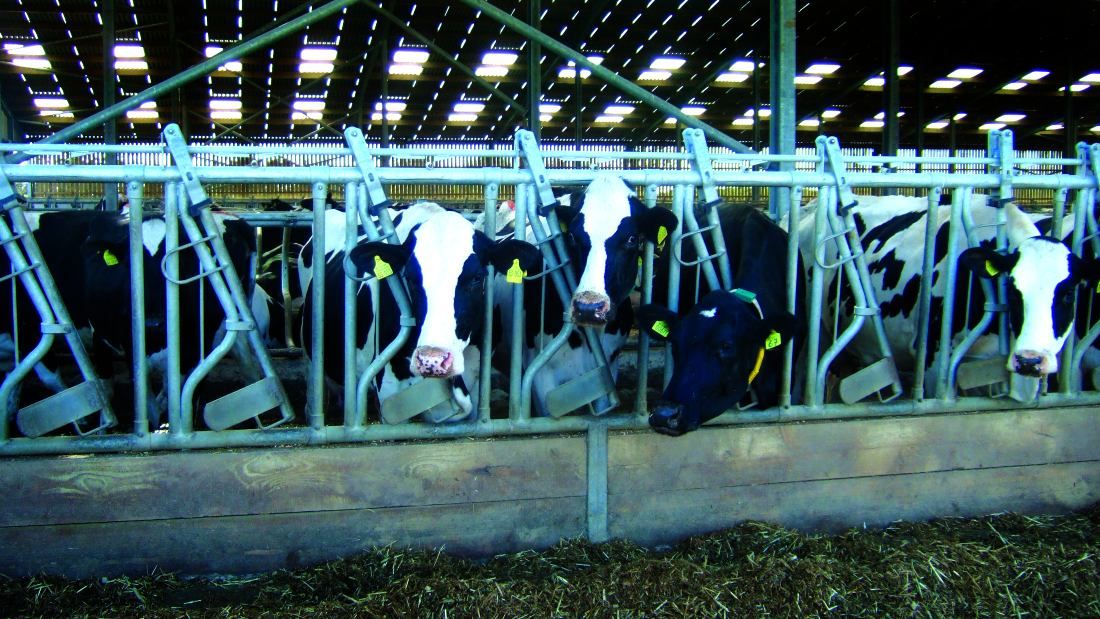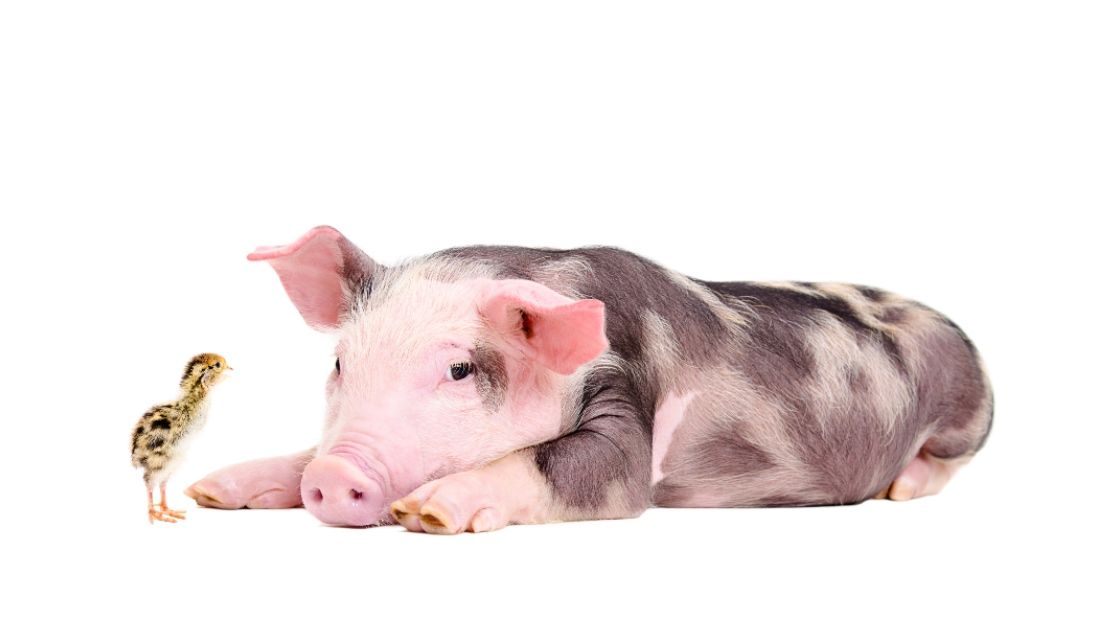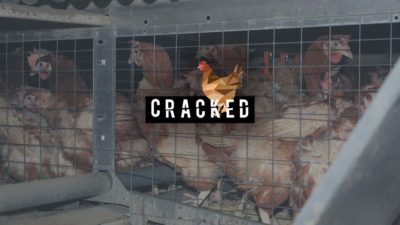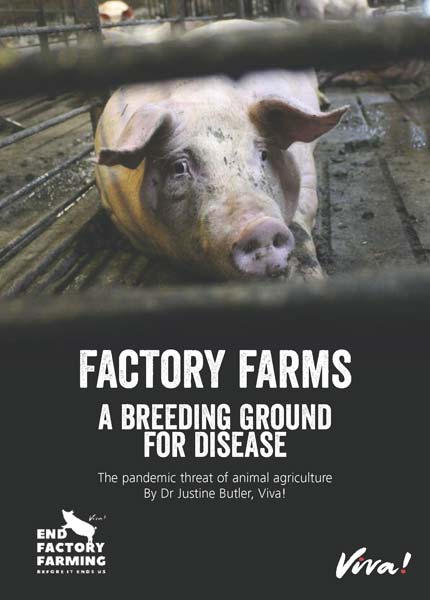Final Warning

Apparently, we are a nation of animal lovers, yet we continue to allow, even support, the systemic abuse of millions of farmed animals, year after year. Most of the meat people eat today comes from genetically uniform, immunocompromised, regularly drugged animals packed by the thousands into filthy sheds or stacked cages. The perfect environment for emerging diseases.
In Britain alone, over a billion farmed animals are killed every year in slaughterhouses. Every day in the UK over two-and-a-half million chickens are slaughtered for meat – that’s 30 deaths every second. Viva! has filmed in a number of intensive broiler “meat” chicken units, finding grim, windowless sheds crammed with thousands of miserable birds kept under artificial light. We estimate that there could have been up to quarter of a million chickens on one farm we visited.
Viva!’s recent investigations at Hogwood pig farm in Warwickshire and Flat House Farm in Leicestershire exposed extreme overcrowding, routine mutilation, cruel farrowing crates, sick and dying pigs abandoned in gangways, the dead left to rot amongst the living, painful lacerations from brutal assaults and live cannibalism. There are many, many other farms just like these, providing an ideal breeding ground for disease.
The next pandemic might come from a poultry farm or a pig farm – as the 2009 swine flu pandemic did. It may be caused by an antibiotic-resistant superbug or a virus. We are fast-approaching a post-antibiotic era where infections and minor injuries may mean a death sentence. It’s predicted that antibiotic-resistant infections might kill more people than cancer by 2050 if we carry on using so many antibiotics in animal agriculture.
Some avian influenza viruses kill more than 50 per cent of those infected. If one mutates to become more easily spread, like seasonal flu, we could be facing anything from five to 150 million deaths says David Nabarro, one of the most senior public health experts at the World Health Organisation.
More and more scientists are acknowledging the role that eating animals plays in the emergence of infectious diseases. Writing in the journal Disaster Medicine and Public Health Preparedness, scientists said that the world must now implement stricter rules on food hygiene and consumption globally. They said: “International communities and organisations have strict rules against atomic bombs, chemical and biological weapons, wars, and many other traumatic events and all are more or less adhering to the rules. However, there are no such international rules on food consumption.”1Farnoosh G, Zarei S, Hosseini Zijoud SS et al. 2020. Is there a guarantee that the crisis of COVID-19 will not be repeated? Disaster Medicine and Public Health Preparedness. 1-2. [published online ahead of print] Available: https://www.ncbi.nlm.nih.gov/pmc/articles/PMC7156560/ [Accessed 3 June 2022]. The best way to prevent the spread of contagious and deadly diseases, the authors of this study say, is to modify food culture worldwide. That means ending factory farming as well as wildlife markets.
If we ignore the facts, the crisis of the coronavirus pandemic will be repeated as the reckless exploitation of animals endangers lives around the world. Scientists have been warning us for years about the potential pandemic threat posed by food systems. It’s likely that Covid-19 came from a wet market in China. The dreadful, cramped conditions and mix of wild and domestic creatures alongside throngs of people, provided an ideal environment for an emerging zoonotic disease.
However, a pandemic risk resulting from the ill-treatment of animals lies closer to home – in a factory farm near you! As industrialised farming has spread around the world, diseases have followed. Densely packed sheds containing stressed animals, confined in filthy surroundings, with low immunity having been bred for fast growth. It’s an ideal environment for a mutating bacterium, virus or antibiotic-resistant superbug to emerge. It’s no surprise, therefore, that three in four new or emerging infectious diseases come from animals. Scientists say: “It is the system of factory farming that presents the relevant risks and we can never know in advance at which farm the next pandemic will originate.”2Bernstein J and Dutkiewicz J. 2021. A public health ethics case for mitigating zoonotic disease risk in food production. Food Ethics. 6 (2) 9.
In 2020, a report called Preventing the Next Pandemic: Zoonotic diseases and how to break the chain of transmission, a joint effort from the United Nations Environment Programme (UNEP) and the International Livestock Research Institute, warned that further outbreaks will emerge unless governments take active measures to prevent other zoonotic diseases from crossing into the human population. The message could not be starker – unless we address the causes of the coronavirus pandemic, the ongoing destruction of nature will lead to more animal diseases spreading to humans.3UNEP and International Livestock Research Institute. 2020. Preventing the Next Pandemic: Zoonotic diseases and how to break the chain of transmission. Nairobi, Kenya.

The report said that while wildlife is a common source of emerging infectious diseases, farmed animals are also original sources, transmission pathways and amplifiers of zoonotic diseases. Industrial farming of animals, especially pigs and chickens, is one of the primary risks for future spillover of zoonotic diseases. A key message in the report is that: “Pandemics such as the Covid-19 outbreak are a predictable and predicted outcome of how people source and grow food, trade and consume animals and alter environments.”3UNEP and International Livestock Research Institute. 2020. Preventing the Next Pandemic: Zoonotic diseases and how to break the chain of transmission. Nairobi, Kenya.
Doreen Robinson, UNEP’s Chief of Wildlife told the Guardian: “Human activity is breaking down the natural buffer that once protected people from a number of pathogens. It’s critically important to get at the root causes, otherwise we will consistently just be reacting to things.”4Carrington D. 2020. Coronavirus: world treating symptoms, not cause of pandemics, says UN. Available: https://www.theguardian.com/world/2020/jul/06/coronavirus-world-treating-symptoms-not-cause-pandemics-un-report [Accessed 3 June 2022].
The UN report looks at the causes of the emergence and spread of Covid-19 and other zoonotic diseases, with the aim of helping policymakers prevent future outbreaks. It identifies a number of factors driving zoonotic disease outbreaks; the rising demand for animal protein, more intensive and unsustainable farming practices, greater exploitation of wildlife, surging global travel and the climate crisis.
The One Health approach shared by a number of health organisations recognises that the health of people is closely connected to the health of animals and our shared environment. The UNEP report builds on the One Health approach as the best hope for preventing future pandemics. Adopting this approach will, the report says, unite medical, veterinary and environmental experts, in order to help governments, businesses and society in general achieve enduring health for people, animals and environments alike.
Despite all the warnings from international bodies like the World Health Organisation and UNEP, there remains a clear lack of political will to change the way we eat but people are making up their own minds – for the animals, the planet and their health. Market researchers Euromonitor International says that more consumers are shifting to vegan and vegetarian diets with those restricting animal-based foods (flexitarians) accounting for over 40 per cent of global consumers in 2020.5Euromonitor International. 2020. Consumers in 2021. Available: https://www.euromonitor.com/consumers-in-2021/report [Accessed 3 June 2022].
As we emerge out of the coronavirus pandemic, many people are looking forward to getting back to normal. But if we’ve learnt anything, it’s that “normal” is what got us into this mess! Infectious-disease physician Dale Fisher told the BBC: “One of the worst things we can do is when this is over, we just go back to normal. If you don’t learn from it, then history will repeat itself.”
If one of the Government’s responsibilities is to protect public health, then they have an obligation to change the way animal foods are produced and end factory farming. Our relationship with animals and the environment can no longer just focus on exploitation. The way animal foods are produced is now considered to be a global threat and we have had our final warning.
We must end factory farming now before it ends us.

Factory Farms – a breeding ground for disease, the pandemic threat of animal agriculture
Scientists have been warning us for years that the next pandemic could come from a factory farm. We’ve already seen BSE, bovine TB, avian influenza (bird flu), swine flu, Campylobacter, Salmonella, antibiotic-resistant superbugs and more coming from factory farms. The next serious outbreak of an infectious disease leading to a pandemic may be caused by a bird or swine flu virus. It may be an antibiotic resistant superbug or some other previously unseen infectious disease. This report explains why it is vital to end this abuse of animals and move towards a plant-based food system. It’s a case of ending factory farming before it ends us!





